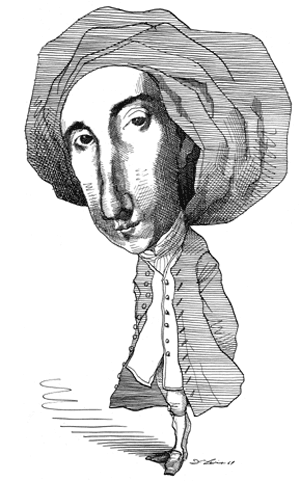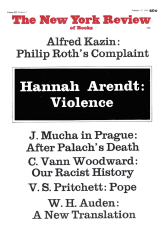Mr. Quennell’s biographical studies in the Regency and eighteenth century are known for their feeling for the elegant and bizarre, but not for this quality alone. His Byron, his essays on Boswell, Hogarth, and Gibbon, and particularly on Sterne, show an historian’s care, a moralist’s curiosity about human nature but, above all, a searching interest in the crystallization of each artist’s imagination; and, like pretty well everyone since Lytton Strachey, he is indifferent to the denigration of everything in the eighteenth century by the Romantics of the headstrong Victorian Age.
He could not have chosen a better subject for an exhaustive biography than Pope, who in urbanizing God, Man and Nature, and the primitive heroes of Homer, in docketing the passions and cataloguing the sewage—with all the zest of a rational mind—is one of the opening century’s representative men. The present volume takes up the first forty years of Pope’s life, to The Dunciad, when Pope, the relatively benign sylph, turned finally into Pope the screeching and wretched little dwarf of the caricatures. In this first volume he is still, mostly, the little prince. To write such a life justly is a huge task not only because of the continuing dispute about the poet’s monotonous brilliance, but because Pope’s acquaintance runs into the whole of aristocratic, political, social, and intellectual England; and to bring these people to meaningful life, as Mr. Quennell does, without hamming and gingering up the merely picturesque, is an achievement. He watches closely the poet’s growth, is excellent on the poetry itself, and approaches his prickly character with curiosity and compassion.
Two things mainly strike us about eighteenth-century England now that the histrionic Victorians no longer block the view. The first is that its leaders and writers were in rebellion against the metaphysical poets and were anxious for settlement, in soul and body, after the period of civil and religious strife. They were inventing pragmatism, polishing up a new conformity. They succeeded in their trite, orthodox, and practical way in establishing a society fit for Mr. Worldly Wiseman to live in. They replanned his towns, they reformed his manners, and paid for it all out of the new wealth of the growing mercantile interest. Pope records the new affluent society in his discussion of the Use of Riches in the Moral Essays. It is typical that the essay discusses:
B. What nature wants, commodious Gold bestows,
Tis thus we eat the bread another sows.
But how unequal it bestows, observe,
‘Tis thus we riot while, who sow it, starve.
What Nature wants (a phrase I much distrust)
Extends to Luxury, extends to Lust…..
B. Trade it may help, Society extend.
P. But lures the Pirate, and corrupts the Friend.
B. It raises armies in a Nation’s Aid
P. But bribes a Senate, and the Land’s betrayed.
He has his eye on the monetary crisis:
P. Blest paper-credit! last and best supply!
That lends Corruption lighter wings to fly.
Gold imp’d by thee, can compass hardest things,
Can pocket States, can fetch or carry Kings:
There is a good deal of the self-sufficient copy book moralist in Pope: “Order is heaven’s first law”; Nature is unconquerable but Reason refines and guides it. If Pope spoke for his age (Mr. Quennell says) he also helped to mold it. The first decade of the eighteenth century had been sterile:
Since Dryden’s death, both prose and poetry….had descended to a very low level; and the language itself was in a state of flux. Such was the opinion of Swift and Bolingbroke; and while Swift had talked of founding an academy to reform and regularise our native tongue Bolingbroke had insisted that Pope must on no account abandon poetry; for by writing original verse he would “contribute to fix” the language, and raise it to the classical dignity of Greek and Latin.
It was becoming above all an age of builders and rebuilders in mind and brick—never have English houses and towns been so fine—but the accomplishments of this deeply sociable century were achieved at a haunting cost and Pope’s venom, his life theme (in Lytton Strachey’s words “civilization illumined by animosity”), suggests that the cost was madness.
The second thing that strikes us is the paradox that the period which attempted, as Pope did, the didactic; morally useful standardization of God, Man and Nature, and which talked so much of Reason, should have been such a paradise for extravagant, irrational characters. In the marriage of Reason and Nature, Nature comes out fantastically on top. In fact, the English novel is born out of this mixture of platitude and extravagance, and half the quarrel about Pope’s poetry comes from the fact that, like the novel, it is all portraiture, condensed biography and critical inquiry. Whole passages might come from Clarissa. Lovelace is pure Pope. There seems to have been a new discovery of the first person singular, of the free, risible, or detestable personality, a belief in it as a self-justified enormity. What sterner and yet more sensible moralist than Dr. Johnson; yet how rampant his character! And beside enormous Johnson we see fiendish little Pope among his friends and enemies, the four-foot-six dwarf, sick and hump-shouldered, smoothing Homer into couplets, building his grotto, advising statesmen on their mansions, an exquisite yet devilish miniature of whom everyone is afraid and yet all in the end admire. After all, as Mr. Quennell remarks, Lady Mary Wortley Montague paid him the handsome compliment of attacking him in the nearest she could get to his own manner.
Advertisement
One has to recognize that the violent quarrels and bitter intrigues that went on in London life were conducted by people with the animal skills of either the lynx or the great apes; and that the taste for refinement, learning, wit, and the urbane, was egged on by a still innate coarseness and hatred. Pope is denounced for the sewage games in The Dunciad and for the images of the sewage nymphs:
…Young Lutetia, softer than the down,
Nigrina black and Merdamente brown
while God squats on his close stool in heaven. But the filth of place and person assaulted every day the preachers of fastidiousness; and Mr. Quennell asks
May he not perhaps, while he ducked and befouled the Dunces, have sought a method of symbolic revenge against his own defects in flesh-and-blood? It was a horror of life that had helped to produce The Dunciad, just as much as the hatred he professed “for the common enemies of mankind.”
So the dream of Reason creates Monsters. The idealizing and gardening of Nature, earthly or human, the new love of perspectives that bring new “delights” cannot altogether protect the builder of the earthly paradise from lassitude or shock.
Still, the horror of life is nothing new. Great writers—and bad ones—have had it. What is interesting in Pope is that his extreme physical handicap also insured him against the shocks of the world in childhood and youth. The disaster was almost an advantage: he was surrounded by love. The learned boy was encouraged, tutored, cared for; a lasting devotion to a few friends was implanted. He lived in almost pastoral and uncensored happiness. He learned to be stoical, was even vain of his littleness; pride and intellect and sedulous study gave him the triumphs of a brilliant mind. His position in the eyes of women was humiliating, but he became a fond toy and was closer to the sensibility of women than their “engrossing” husbands, and saw the degrading effects of the inevitable marriage auction. In his poems he is the Sylph among the Sylphs. Of course the horror and the sexual rage must always have been there; but his use of them is the important thing.
He was a solitary but his family had been solitaries of a sort before him. Catholics, they were obliged to live in country exile among other Catholic families and were forbidden office: they lived, without many troubles, in a small pastoral world where they could cultivate the detachment and the family wit of the not very seriously persecuted. Upon such solitary influences Pope, the miniature, built the taste for the miniature: in poetry two sets of antitheses in two lines, the epigram, the image all the more vivid for being condensed and boxed. Of fashionable women in old age:
A fop their passion, and their prize a sot,
Alive ridiculous, and dead forgot!
The famous grotto and its extraordinary tunnel, and camera obseura were expressions of the solitary’s fantasy and bent for artifice—“a shadowy retreat from life” from which, as Dr. Johnson said, cares and passions could be excluded. And Mr. Quennell shows us the love of artifice beginning, as Pope gets older, to feed “the love of secrecy, mystery, evasion, subterfuge.” He loves (as Dr. Johnson, again, said) to attain his purposes when he deceived for deception’s sake, for sheer pleasure in ingenuity. His enemies were captured for his own pleasure in his private world and hung as grotesques in his spidery larder. The line about the spider seems to describe an ideal life:
The spider’s touch, now exqui- sitely fine!
Feels at each thread, and lives along the line
He can string up a Hervey and dine off him:
Whose buzz the witty and the fair annoys
Yet ne’er tastes, and beauty ne’er enjoys:
So well-bred spaniels civilly delight
In mumbling of the game they dare not bite.
Mr. Quennell has another suggestion: that the longevity of Pope’s mother was a mixed blessing:
Advertisement
Her gentle but inescapable presence had overcast his youth and manhood….having done his duty by loving Mrs. Pope, which now and then required a conscious effort, he was apt to take his revenge and exercise the spirit of revolt, by antagonizing and tormenting others.
About the Blount sisters and Lady Mary Wortley Montague, Mr. Quennell notes that Pope “enjoyed breathing the heady atmosphere of the self-centred world in which [women] lived.” He was privileged to write libertine letters. They clearly loved his innuendoes. The tale that the quarrel with Lady Mary was started when she returned borrowed sheets to his mother unwashed, or the other one that the Ambassadress shouted with laughter when Pope declared his love, is less interesting than the probability that she had become too rumbustiously grand and, perhaps, coarser after her triumphs in Turkey, and that in any case Pope had exhausted his feeling in the idealizing and artificializing letters he had sent to her. Both he and she saw the excitements and the dangers of ridicule, but nothing turns to hate sooner than idealism that has run out. It also seems likely that although in the eighteenth century the prestige of Literature equaled and almost supplanted aristocratic power in society, the aristocracy was still a closed world. To a Chesterfield or a Bolingbroke, literature was important but also something embellishing to the patron; and Lady Mary would obviously be careless about making a poet jealous of a duke. Rich, famous, proud, a ruling despot Pope might be—but he was middle class! Twickenham was a small “place”—only five acres! Imagine calling five acres “land”!
The next volume will show us a much darker portrait of the poet, but we can depend on Mr. Quennell’s intelligent sympathy and his power of rescuing a well-known period from the reach-me-down ironies and set pieces which a pathetic nostalgia for “elegance” and aristocratic fashion so often imposes on a style-less period like our own.
This Issue
February 27, 1969




